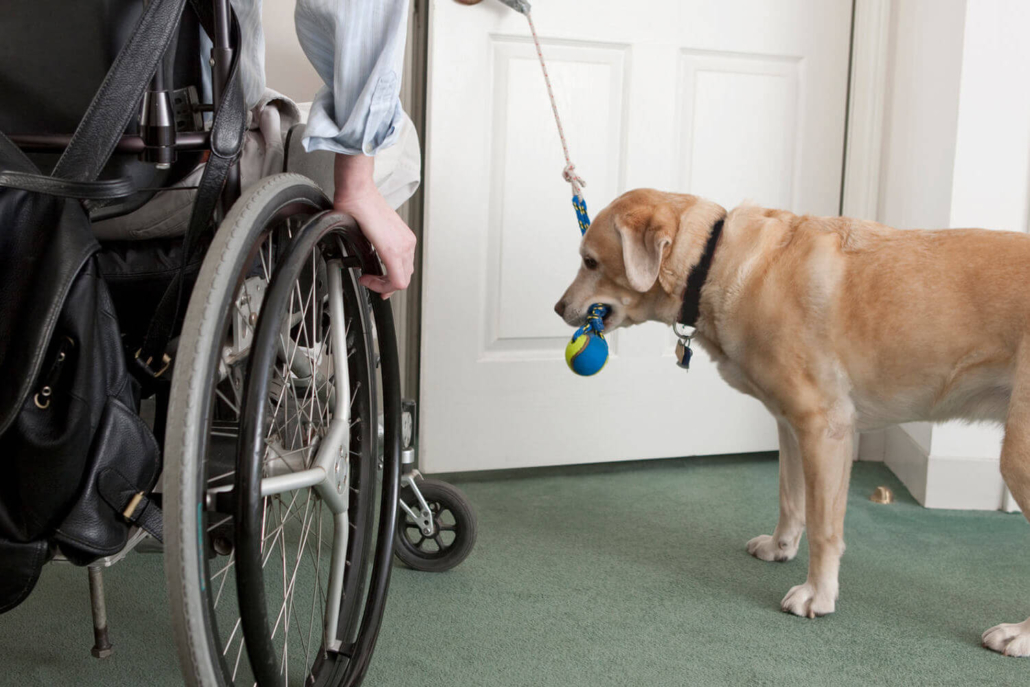Understanding Service Animals, Emotional Support Animals, and Pets on Airbnb
Introduction
As an Airbnb host, it’s not just your home that you’re opening up to guests, it’s also a world of experiences and responsibilities. One crucial aspect of hosting involves understanding Airbnb’s Accessibility Policy, which aims to provide an inclusive environment for all guests, including those with service animals and emotional support animals. This article will guide you through the legal and ethical landscape surrounding these issues, allowing you to host with confidence.
Airbnb’s Accessibility Policy: An Overview
Airbnb’s policy is crafted to align with legal norms, stipulating that reasonable accommodations should be made for people with disabilities. It includes directives for service animals and emotional support animals, and failing to adhere to these guidelines may result in your removal from the Airbnb platform.

The Nuts and Bolts of Airbnb Service Animals
Service animals play an indispensable role in enhancing the quality of life for people with disabilities. They’re not just companions but highly trained assistants that perform specific tasks, enhancing freedom, confidence, and safety for their owners. Here’s what hosts need to know about the ins and outs of service animals on Airbnb.
What Is an Airbnb Service Animal?
It’s crucial to differentiate between pets, emotional support animals, and service animals. A service animal is typically a dog or a miniature horse that has undergone rigorous training to perform specific tasks for individuals with disabilities. These tasks can range from guiding visually impaired individuals to retrieving items for those with mobility issues, and more. It’s not a choice, but a necessity for the individuals they assist.
What Airbnb Allows for Service Animals
Understanding Airbnb’s policy can help you, as a host, provide a welcoming environment for guests with service animals. Airbnb allows guests to bring along their service animals without the requirement of prior notice when booking. While it might come as a surprise to hosts, it is based on the principle of non-discrimination. However, you are permitted to ask two specific questions to verify the legitimacy of the service animal:
- Is the service animal required because of a disability?
- What work or task has the service animal been trained to perform?
These questions help you better understand your guest’s needs without infringing on their privacy or rights.
What Airbnb Doesn’t Allow for Service Animals
In line with the platform’s inclusive ethos, there are specific actions hosts are not allowed to take concerning service animals:
- Refuse a Reservation: You cannot decline a guest because they have a service animal.
- Charge Extra Fees: Imposing additional costs for accommodating a service animal is not permitted.
- Differential Treatment: Treating guests with service animals differently in any way is against Airbnb’s policies.
By understanding these crucial points, you can ensure that you’re not only complying with Airbnb’s policies but also contributing to a more inclusive and accommodating community. Hosting guests with service animals might require a little more preparation, but the rewards, both emotional and reputational, can be significant.
Navigating Airbnb Emotional Support Animals
Navigating the realm of emotional support animals can be a complex endeavor for hosts on Airbnb. It’s essential to grasp the definition, scope, and regulations surrounding these animals to offer a safe and compliant hosting experience. Here’s what you need to know.
Definition and Scope
Firstly, it’s crucial to differentiate emotional support animals from pets and service animals. Unlike service animals, emotional support animals don’t undergo specialized training to perform tasks for individuals with disabilities. Instead, they provide a different but equally significant role by offering emotional support and companionship to people suffering from mental health issues such as depression, anxiety, or loneliness.
What’s Allowed and What’s Not
Airbnb’s policy varies depending on jurisdiction, which hosts must take into consideration. In states like New York and California, charging additional fees for guests accompanied by emotional support animals is not allowed. This is in line with state laws that extend additional protections to emotional support animals.
However, in other jurisdictions, Airbnb gives hosts more latitude. You may be allowed to charge pet fees for emotional support animals or even decline their presence altogether. This flexibility aims to balance the guest’s needs for emotional support animals with a host’s capacity to accommodate them.
Airbnb Pets: A Separate Category
When it comes to hosting on Airbnb, pets constitute a category of their own that differs significantly from service animals and emotional support animals. This distinction is crucial for hosts to understand in order to navigate the complexities of Airbnb’s rules and set up their own pet policies. Here’s a closer look at what you should know.
General Guidelines for Hosting Airbnb Pets
Pets are not protected under Airbnb’s Accessibility Policy, which means hosts have more leeway in determining how to manage guests who wish to bring pets into their property. As a host, you have the freedom to set your own guidelines regarding pets. This might include imposing pet fees, requiring pet deposits, or even declining guests who wish to bring pets.
Crafting Your Pet Policy
When crafting your pet policy, it’s advisable to be as specific as possible. Clearly outline whether you allow pets, what types of pets are permitted, and any size or breed restrictions you may have. Also, specify any additional fees for cleaning or potential damages. Transparency is key here; the clearer your policy, the fewer misunderstandings you’ll have with guests.
Consideration for Allergies and Comfort
As a host, it’s not just the pet owners you have to consider; think about future guests who might have allergies. If you allow pets, ensure you also have a comprehensive cleaning process in place to eliminate any allergens for subsequent guests. You could also designate certain rooms or areas as “pet-free” to accommodate guests with allergies.
Airbnb Pet Amenities: Going the Extra Mile
If you decide to allow pets, consider providing pet amenities like bowls, pet beds, or even a small welcome package for the furry friends. This not only makes for a delightful experience for your guest and their pet but could also lead to better reviews and, ultimately, more bookings.
Airbnb Safety Precautions
Safety is paramount. Make sure that your space is safe for pets. Remove any hazardous items that pets might be tempted to chew on or swallow. If you have a yard or an outdoor space, check for secure fencing to prevent pets from running away.

Understanding “Reasonable Accommodations”
The concept of “reasonable accommodations” is crucial for hosts, especially those who might host guests with disabilities, service animals, or emotional support animals. Understanding how to handle these special requests can not only help you comply with legal requirements but also contribute to a more inclusive and welcoming community. Here’s a deeper dive into what this means:
How to Handle Requests
When a guest with a disability requests an accommodation, it’s not just about compliance—it’s also an opportunity to extend your hospitality to make someone’s stay as comfortable as possible. Here are some ways to handle such requests effectively:
Immediate Acknowledgment: Promptly acknowledge the request to let the guest know you have received it and are considering it.
Open Dialogue: Engage in a conversation to understand the specific needs of the guest. This allows you to offer more tailored accommodations.
Be Honest: If you’re unsure whether you can meet a particular request, it’s better to express your concerns upfront rather than make a promise you can’t keep.
Consult Authorities: When in doubt, consult the local laws and Airbnb’s policy to make sure you’re in compliance.
What’s Allowed and What Isn’t
The concept of “reasonable accommodations” is nuanced. While you’re encouraged to meet the guest’s requests, there are boundaries. Here are some insights into what’s usually allowed and what isn’t:
Counter-offers: You are allowed to make counter-offers if you can’t meet the guest’s original request but can provide a different form of accommodation that still meets their needs.
Solid Rationale for Refusal: If you have to refuse a request, you must provide a strong, justifiable reason. This could be anything from increased safety risks to other guests to structural impossibilities that make the request unattainable.
Legal and HOA Guidelines: Always check your local laws and your homeowner’s Association guidelines. There may be restrictions or obligations that you need to be aware of.
Documentation: Keep a record of all interactions concerning reasonable accommodations. This documentation can be crucial if any disputes arise later.
Understanding and correctly handling “reasonable accommodations” is a skill that takes time to develop. However, with an empathetic approach and a thorough understanding of the rules, you can turn special requests into opportunities for exemplary service.
Consequences for Non-Compliance
What Could Happen
Failure to adhere to Airbnb’s policies can result in warnings, temporary suspensions, or even permanent removal from the platform.
Your State and Local Laws
How to Keep Up to Date
Always consult local and state laws when crafting your Airbnb policy, as they can have additional or contrasting requirements.
Proactive Measures for Hosts
Building a welcoming space for all guests, including those with service animals, emotional support animals, and pets, involves a bit more than just basic accommodations. Here are some proactive measures you can take as a host to ensure a smooth experience for everyone involved.
Building a Pet-Friendly Space
Taking steps such as installing pet gates or having a designated pet area can make your hosting experience smoother. In addition, consider the following:
- Non-Toxic Cleaning: Use pet-friendly, non-toxic cleaning products to ensure a safe environment for animals.
- Pet Amenities: Stock up on pet bowls, mats, and perhaps a few toys. Little touches like these can make a big difference.
- Outdoor Areas: If you have a garden or a backyard, ensure it is securely fenced so that pets can roam freely without the risk of escaping.
- Clear Guidelines: Make sure to outline any restrictions or guidelines for pets in different areas of the property in your house rules.
Insurance and Liability
Insurance is not just for your peace of mind but also an essential aspect of responsible hosting. Consider the following:
- Comprehensive Coverage: Look for insurance policies that provide comprehensive coverage for potential damages caused by pets, service animals, or emotional support animals.
- Legal Requirements: Check the legal requirements in your jurisdiction regarding insurance and make sure your policy complies.
- Damage Deposits: Consider asking for a reasonable damage deposit specifically aimed at covering potential pet-related damages. Make it clear in your listing that this deposit is refundable if no damage occurs.
- Documentation: Keep records of all communications regarding pets and any agreements made, as these may be useful in cases of disputes.
By taking these proactive measures, you can welcome guests with service animals, emotional support animals, and pets in a way that makes the experience enjoyable and stress-free for both parties.
Hosting Etiquette: Best Practices
Maintaining open lines of communication is crucial for a smooth Airbnb hosting experience, but it doesn’t stop there. To stand out as an exceptional host, consider offering personalized touches like welcome notes or local snacks. For guests with service or emotional support animals, a quick home tour highlighting animal-friendly areas can go a long way. It’s also a good idea to have a property guidebook that outlines house rules and local attractions, which can serve as a quick reference for your guests. Anticipate possible concerns and address them proactively—whether that means securing items that a service animal could knock over or implementing seamless check-in and check-out procedures like self-check-in or lockboxes. Always respect guests’ privacy, and after their stay, send a polite thank-you message encouraging them to review their experience. Keep your listing updated and well-maintained to attract a broad range of guests and meet their expectations effectively. By incorporating these best practices, you’ll offer a memorable and comfortable stay for all your guests, including those with service animals and emotional support animals.
Conclusion
In summary, Airbnb hosts must navigate a complex but essential landscape when it comes to accommodating service animals, emotional support animals, and pets. Understanding Airbnb’s Accessibility Policy is crucial, as it dictates what is legally and ethically expected of hosts, particularly concerning service animals and emotional support animals. Service animals are more than pets; they are specially trained to assist individuals with disabilities and are protected under the platform’s non-discriminatory policy. Emotional support animals, while not trained for specific tasks, also offer invaluable emotional support to owners and may be protected under state laws. On the other hand, pets are not covered by accessibility policies, giving hosts more latitude in crafting their own pet rules. Beyond policy compliance, exceptional hosting involves creating a welcoming environment that meets individual needs, from offering pet-friendly amenities to making “reasonable accommodations” for guests with special requests. Proactive measures such as pet-proofing your space, securing comprehensive insurance, and maintaining open, respectful communication with guests can go a long way in creating an inclusive, enjoyable experience for all. Failure to adhere to these policies and guidelines can result in penalties ranging from warnings to removal from the Airbnb platform, making it imperative for hosts to be well-informed and prepared.
Explore How To Prepare Your Airbnb For Kids.

















